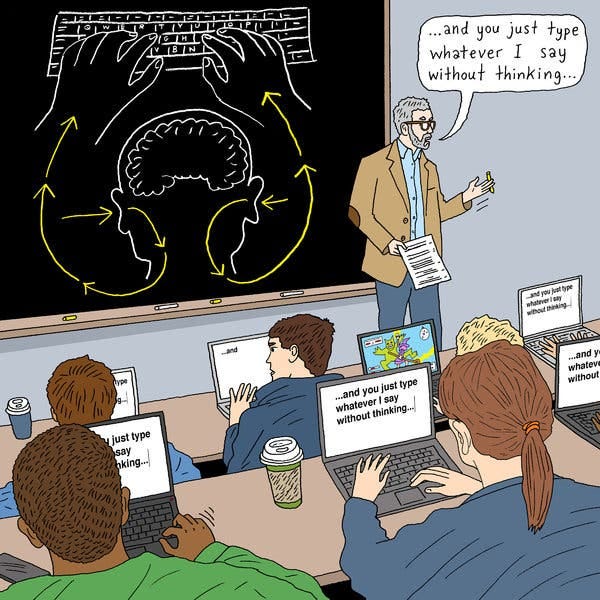Have you ever listened to a podcast, but struggled to recall it the next day? Or finished a chapter only to draw a blank? You’re not alone. The trouble is ‘passive learning’. When our brains merely receive information without active engagement, we can simply forget.
Our brains aren’t mere buckets waiting to be filled with knowledge. They’re more like playgrounds, thriving with interaction and engagement. When we actively grapple with new ideas - comparing, questioning, or applying them - we’re creating connections, joining the dots, strengthening our lateral thinking.
University is a really special opportunity to build a vibrant learning community. Collaboration massively enriches education, far more so than any tech or quiet study. Meeting people from different backgrounds, engaging in discussions, and learning together creates a dynamic atmosphere that fosters creativity and critical thinking. Community matters, as strengthened by collective rituals. That’s how we bond as a group, build trust and feel in sync. At King’s College London, we are so fortunate to welcome brilliant minds from around the globe, sharing diverse perspectives and forging friendships.
But now we have a serious challenge..
The Internet is Very Distracting!
Millions of dollars have been poured into making online apps exciting and engaging, diverting user attention with a tsunami of treats to keep them tantalised. The constant stream of emails, social media alerts, messages, and new photos generates perpetual distraction.
Even if devices are on silent, they still dispense little hits of dopamine, engineered by tech wizards to keep users hooked. Let’s be honest, I’m just a little academic with niche interests in culture and structural transformation. For all my ‘jokes’ and ‘fascinating insights’, I simply cannot compete with internet sirens.
How Should We Respond?
Across the United Kingdom and Australia, teachers are now prohibiting phone use. Most British parents are supportive.
Universities, meanwhile, are still laptop-friendly. What’s driving this asymmetry? What’s the difference between scrolling on your phone or your laptop? Whether an email pings in your palm or your lap, it’s equally distracting.
Libertarians may object that university students are adults, who can make their own informed decisions. And that’s true. But by choosing to come to my class, students are implicitly recognising my greater knowledge.
14 years of teaching has given me valuable insights into how to create conducive learning environments. Supporting students, listening to their feedback, I’ve learned how to build community and foster connections within my teaching. This empirical evidence of what works gives me some authority to structure our style of learning.
Laptops create negative externalities
Susan Dynarski (Harvard Professor of Education) is very clear: ‘students learn less when they use computers during lectures’. Careful empirical research also shows negative externalities. Students perform worse when others nearby are on laptops!
If half my students are lost in a Whatsapp wormhole, this depresses participation. Seldom seeing others ask questions, others may be nervous to raise their hand. No one wants to be the odd one out. Frankly, the entire class becomes dull! If I ask students to discuss trade liberalisation in pairs, but half have been distracted by messaging apps, then conversations may hit a brick wall. Phones suck attention, weaken engagement, and basically decimate expectations of fun, enjoyable, active participatory discussions. In the long run, this will affect attendance. Why bother coming if no one talks?
Addressing concerns
Now let me consider another objection. “What if students want to take notes?”. Actually, that’s great! Anyone bursting with big ideas, questions and contributions is always welcome to use pen and paper. My goal isn’t to suppress note-taking, but to encourage present, engaged and collective participation.
Professor Dynarski adds another exception, for those with learning disabilities. I agree. This is an important part of inclusivity.
And I’m no Luddite! At times, I will explicitly encourage my students to engage with Research AI tools (like Claude), such as to get instant essay feedback. However, in order to create AI-complementary skills, we also need to build in-person connections. That’s how we capitalised on our uniquely human edge and outsmart AI.
Creating a Connected Community
Ultimately, I want to build a vibrant learning classroom experience. Phones and laptops can be useful, but they’re also like that chatty friend at the cinema, distracting from the main event.
So, to play on my earlier metaphor, here’s where I’ll actually limit competition and be a bit protectionist. By asking students to stow their devices, I’m cultivating an environment where people truly connect. This approach encourages my students to tune into each other, facilitating collaborative learning and community.








V much appreciate the meme Alice :)
Thanks for this. I retired as a career high school teacher in June from the Los Angeles USD. Not long after my old employer drew a lot of praise for banning smartphones in the classroom. It wasn’t an empty gesture but got more praise than warranted, because lost in all the hoopla was the fact that the district issues every secondary student (not sure about elementary) a Chromebook, part of a big contract with Google. YouTube is still easily accessible; it has some utility but mostly as a supplement and sideshow to quality instruction and engagement. So banning phones is a good move but won’t banish the kind of distraction still available at their fingertips. Unfortunately LAUSD has never instituted a systematic independent reading program, something that would actually stand a chance of making a substantial long-term difference in student learning and achievement. I have seen such a thing work at the classroom and school level. Scaling it up successfully is possible. But, as time has shown, so also is selling pols and bureaucrats on the next great step in ed-tech, whatever it might be.